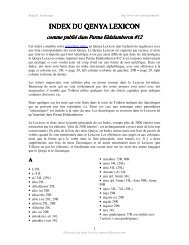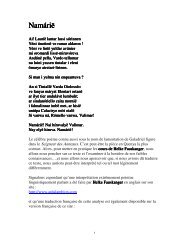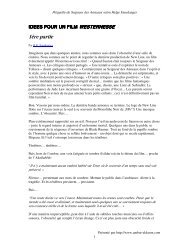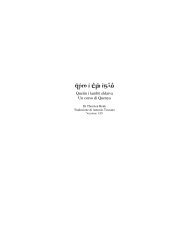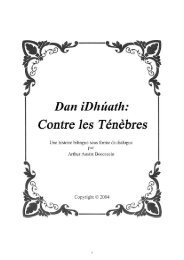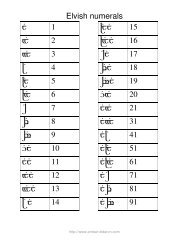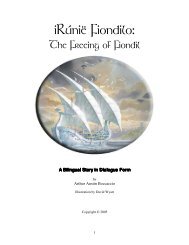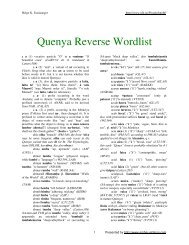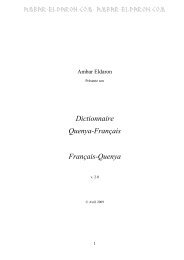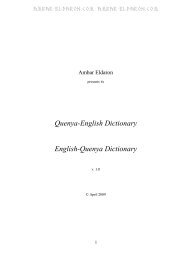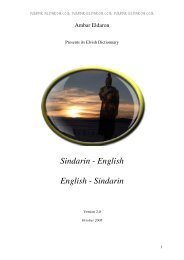English – Quenya - Ambar Eldaron
English – Quenya - Ambar Eldaron
English – Quenya - Ambar Eldaron
Create successful ePaper yourself
Turn your PDF publications into a flip-book with our unique Google optimized e-Paper software.
Helge K. Fauskanger http://www.uib.no/People/hnohf/<br />
what is) Námo (but this is elsewhere glossed<br />
"Ordainer", and the ending -o normally does<br />
indicate something animate/masculine rather<br />
than something abstract). <strong>–</strong>VT41:13, MR:150<br />
JUICE sáva, pirya (syrup) <strong>–</strong>SAB, PIS<br />
JULY Cermië <strong>–</strong>LotR:1144<br />
JUNE Nárië <strong>–</strong>LotR:1144<br />
JUMP cap- (pa.t. campë) (leap) <strong>–</strong>QL:45<br />
cf. PE16:134<br />
JUPITER Alcarinquë (Basic <strong>Quenya</strong>:24,<br />
cf. Silm:55. According to LT1:260, Morwen<br />
KEEN laica (the printed Etymologies has<br />
a final <strong>–</strong>e instead of <strong>–</strong>a, but this is a misreading;<br />
see VT45:25) (sharp, acute, *piercing);<br />
KEENNESS (of perception) laicë (acuteness).<br />
The conceptual validity of these words is<br />
questionable; see PIERCING. <strong>–</strong>LAIK<br />
KEEPING (safe keeping) mando (custody)<br />
<strong>–</strong>MR:350<br />
KHAZAD-DÛM Casarrondo<br />
(Dwarrowvault) <strong>–</strong>WJ:389<br />
KILL, see SLAY<br />
KIN nossë (house, people). DEAR<br />
KINSMAN, see DEAR. <strong>–</strong>LT1:250, 272/LT2:338<br />
KIND nostalë (species) <strong>–</strong>LT1:272<br />
KINDLE tinta- (cause to sparkle), narta-;<br />
in older [TLT] materiel also turu-, tunda- (Note:<br />
there is a homophone meaning "tall") <strong>–</strong>Silm:438,<br />
VT45:37, LT1:270<br />
KINDLY asëa (Þ) (beneficial, helpful) (so<br />
according to a late note where the word is<br />
derived from *ATHAYA). Also (as noun) used as<br />
the name of the healing plant called in Sindarin<br />
athelas.<br />
KING aran (pl arani is attested) In Etym,<br />
the <strong>Quenya</strong> word for "king, chieftain" is haran pl.<br />
harni, but evidence from LotR, WJ and UT<br />
shows that Tolkien changed it to aran pl arani.<br />
Cf. asëa aranion "kingsfoil", i arani <strong>Eldaron</strong><br />
"the Kings of the Eldar", Arandor "kingsland",<br />
aranya *"my king", arandil "king's friend,<br />
royalist", and arandur "king's servant, minister".)<br />
LT1:273 has vardar "king", but this is hardly a<br />
valid word in LotR-style <strong>Quenya</strong>. KINGLY BULL<br />
Aramund (this may not be pure <strong>Quenya</strong>,<br />
because of the final consonant cluster) <strong>–</strong>3AR,<br />
LotR:899, WJ:369, UT:165, 193, 313,<br />
Letters:386, 423<br />
K<br />
(there translated "daughter of the dark") is a<br />
name of Jupiter, but this may not be a valid word<br />
in Tolkien's later <strong>Quenya</strong>. LT1:265 also mentions<br />
Silindo as a name of this planet.<br />
JUST faila (fair-minded, generous) <strong>–</strong><br />
PM:352<br />
KINGDOM #aranië (attested with the<br />
suffix <strong>–</strong>lya "thy" added). Earlier versions of the<br />
text in question had other forms: #turinasta,<br />
#turindië (both also occurring with a long ú). <strong>–</strong><br />
VT43:12, 15<br />
KINGSFISHER halatirno, halatir<br />
(halatirn-) (lit. "fishwatcher") <strong>–</strong>SKAL 2 , TIR<br />
KINGSFOIL (athelas, a healing plant)<br />
asëa aranion <strong>–</strong>LotR:899<br />
KISS (vb.) miqu- "to kiss", pa.t. minquë<br />
(not to be confused with the cardinal minquë<br />
"eleven"). (QL:61). Noun A KISS miquë (QL:61).<br />
KNEE occa <strong>–</strong>QL:70<br />
KNIGHT roquen (rider, horseman) <strong>–</strong><br />
UT:282 cf. WJ:372<br />
KNOB tolma (defined as "protuberance<br />
contrieved to serve a purpose, knob, short<br />
rounded handle", etc.), tolos (lump) <strong>–</strong>VT47:28,<br />
LT1:269<br />
KNOCK #pet- (strike), pa.t. pentë given.<br />
The verb is cited as "pete", perhaps with a<br />
suffixed stem-vowel. KNOCK (keep on knocking)<br />
tamba- <strong>–</strong>QL:73, TAM<br />
KNOLL nóla <strong>–</strong>NDOL<br />
KNOT narda, nútë (bond). Pl. perhaps<br />
*núter not *núti; cf. the similar formation tyávë<br />
"taste", pl tyáver. <strong>–</strong>SNAR, NU<br />
KNOW ista (pa.t. sintë, also isintë;<br />
according to VT48:25 the pa.t. is "certainly<br />
irreg."), KNOW ABOUT hanya- (understand, be<br />
skilled in dealing with), KNOWLEDGE handë<br />
(understanding), ista, istya, issë (lore), nólë<br />
(long study, lore, wisdom). (In Etym this word is<br />
spelt with initial ñ, that is, ng. Initial ng had<br />
become n in Third Age <strong>Quenya</strong>, and I follow the<br />
system of LotR and transcribe it accordingly.<br />
Nólë is so spelt also in Silm:432. But if this word<br />
Wordlist last updated July 5th, 2008 46 Presented by http://www.ambar-eldaron.com



